Bioethics Center names first director
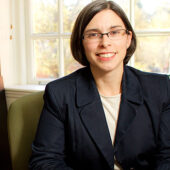 Ana Smith Iltis has been named the director of the new Center for Bioethics, Health and Society, which will address some of the most relevant issues at the heart of biotechnology, medical research and health care.
Ana Smith Iltis has been named the director of the new Center for Bioethics, Health and Society, which will address some of the most relevant issues at the heart of biotechnology, medical research and health care.Categories: Research & Discovery, University Announcements

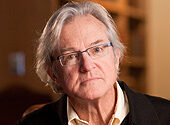 Reynolds Professor of History Paul Escott offers some provocative arguments that challenge what we think we know about Abraham Lincoln, who was elected to his first term as president 150 years ago.
Reynolds Professor of History Paul Escott offers some provocative arguments that challenge what we think we know about Abraham Lincoln, who was elected to his first term as president 150 years ago.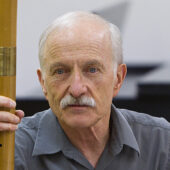 For many years, Stewart Carter has shared his love for Renaissance music with others through an annual concert. This year’s Collegium Musicum Concert, featuring German music of the 16th and 17th centuries, will be held Thursday.
For many years, Stewart Carter has shared his love for Renaissance music with others through an annual concert. This year’s Collegium Musicum Concert, featuring German music of the 16th and 17th centuries, will be held Thursday.
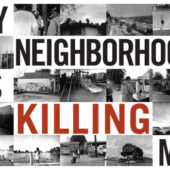 Numerous studies reveal that communities with people of color have borne greater health and environmental risk burdens than society at large. The University will host a discussion on the issues surrounding environmental injustice.
Numerous studies reveal that communities with people of color have borne greater health and environmental risk burdens than society at large. The University will host a discussion on the issues surrounding environmental injustice. Education professor Kristin Redington Bennett knows iPads can revolutionize the K-12 classroom – bringing Internet connectivity to every student and ridding desks and worktables of textbooks, notebooks and binders.
Education professor Kristin Redington Bennett knows iPads can revolutionize the K-12 classroom – bringing Internet connectivity to every student and ridding desks and worktables of textbooks, notebooks and binders.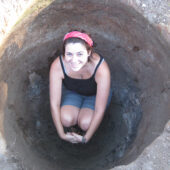 With help from the Richter Scholarship program this summer, anthropology major Hope Scofield joined a field school program sponsored by the Balkan Heritage Foundation. In Bulgaria, she uncovered ceramic storage containers, coins and marble decorative pieces.
With help from the Richter Scholarship program this summer, anthropology major Hope Scofield joined a field school program sponsored by the Balkan Heritage Foundation. In Bulgaria, she uncovered ceramic storage containers, coins and marble decorative pieces. Wake Forest researchers have shown for the first time that drinking beet juice can increase blood flow to the brain in older adults – a finding that could hold great potential for combating the progression of dementia.
Wake Forest researchers have shown for the first time that drinking beet juice can increase blood flow to the brain in older adults – a finding that could hold great potential for combating the progression of dementia.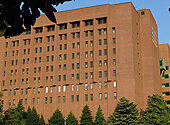 Researchers at Wake Forest's Institute for Regenerative Medicine have grown a miniature liver using human cells. Although it is too small to work for a human, the hope is to grow larger livers or to use them for testing.
Researchers at Wake Forest's Institute for Regenerative Medicine have grown a miniature liver using human cells. Although it is too small to work for a human, the hope is to grow larger livers or to use them for testing. A new book by Assistant Professor of History Charles L. Wilkins offers a historical perspective that shows Muslim societies as complex and not solely focused on warmaking.
A new book by Assistant Professor of History Charles L. Wilkins offers a historical perspective that shows Muslim societies as complex and not solely focused on warmaking.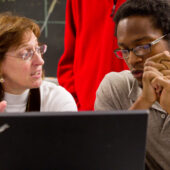 Junior Brandon Turner's research integrates multiple fields and comes under the mentoring eye of Jacque Fetrow, dean of the college. He received the 2010-2011 American Physical Society Scholarship for Minority Undergraduate Physics Majors.
Junior Brandon Turner's research integrates multiple fields and comes under the mentoring eye of Jacque Fetrow, dean of the college. He received the 2010-2011 American Physical Society Scholarship for Minority Undergraduate Physics Majors.